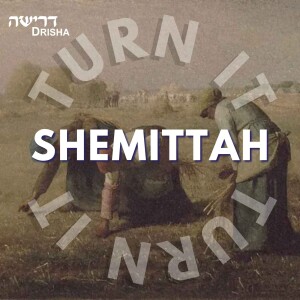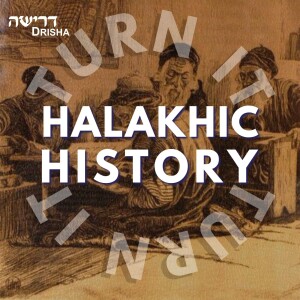Turn it and Turn it
Drisha has often run classes organized around a shared theme or topic. Each season of Turn It & Turn It comprises all the lectures on a given theme, bringing you multiple complementary takes on an issue. This podcast spans two decades, putting some of our earliest audio recordings shoulder to shoulder with more recent and contemporary lectures - all exemplifying the principle that Torah demands persistent, multi-angled study. Turn it and turn it: there’s a lot to discuss!
Episodes

Friday Nov 24, 2023
Friday Nov 24, 2023
This season of Turn it & Turn it is on the topic of: "Shemittah"
The Mishnah in the fourth chapter of Gittin lists a number of Rabbinic decrees created “mi-penei tikkun ha-olam,” for the betterment of the world. One of those listed is the Pruzbol, instituted by Hillel to encourage Jews to make loans to one another. This course will study the Talmudic discussion of Pruzbol in Gittin 36a-37b, which touches on a series of burning questions like “how was Pruzbol allowed in the first place?” and “should we get rid of it?” In each session we will use a section of the Talmud in Gittin as a jumping off point into parallel texts and medieval commentators. This course is oriented towards students with some experience studying medieval Talmud commentators, but most texts will be presented with translation.
This audio was originally captured on 11/15/2021 as part of Drisha's Fall Zman.

Friday Nov 24, 2023
Friday Nov 24, 2023
This season of Turn it & Turn it is on the topic of: "Shemittah"
The Mishnah in the fourth chapter of Gittin lists a number of Rabbinic decrees created “mi-penei tikkun ha-olam,” for the betterment of the world. One of those listed is the Pruzbol, instituted by Hillel to encourage Jews to make loans to one another. This course will study the Talmudic discussion of Pruzbol in Gittin 36a-37b, which touches on a series of burning questions like “how was Pruzbol allowed in the first place?” and “should we get rid of it?” In each session we will use a section of the Talmud in Gittin as a jumping off point into parallel texts and medieval commentators. This course is oriented towards students with some experience studying medieval Talmud commentators, but most texts will be presented with translation.
This audio was originally captured on 11/08/2021 as part of Drisha's Fall Zman.

Friday Nov 24, 2023
Friday Nov 24, 2023
This season of Turn it & Turn it is on the topic of: "Shemittah"
The Mishnah in the fourth chapter of Gittin lists a number of Rabbinic decrees created “mi-penei tikkun ha-olam,” for the betterment of the world. One of those listed is the Pruzbol, instituted by Hillel to encourage Jews to make loans to one another. This course will study the Talmudic discussion of Pruzbol in Gittin 36a-37b, which touches on a series of burning questions like “how was Pruzbol allowed in the first place?” and “should we get rid of it?” In each session we will use a section of the Talmud in Gittin as a jumping off point into parallel texts and medieval commentators. This course is oriented towards students with some experience studying medieval Talmud commentators, but most texts will be presented with translation.
This audio was originally captured from Zoom on 11/01/2021 as part of Drisha's Fall Zman.

Friday Nov 24, 2023
Friday Nov 24, 2023
This season of Turn it & Turn it is on the topic of: "Shemittah"
The Mishnah in the fourth chapter of Gittin lists a number of Rabbinic decrees created “mi-penei tikkun ha-olam,” for the betterment of the world. One of those listed is the Pruzbol, instituted by Hillel to encourage Jews to make loans to one another. This course will study the Talmudic discussion of Pruzbol in Gittin 36a-37b, which touches on a series of burning questions like “how was Pruzbol allowed in the first place?” and “should we get rid of it?” In each session we will use a section of the Talmud in Gittin as a jumping off point into parallel texts and medieval commentators. This course is oriented towards students with some experience studying medieval Talmud commentators, but most texts will be presented with translation.
This audio was originally captured from Zoom on 10/25/2021 as part of Drisha's Fall Zman.

Friday Nov 24, 2023
Friday Nov 24, 2023
This season of Turn it & Turn it is on the topic of: "Shemittah"
The Mishnah in the fourth chapter of Gittin lists a number of Rabbinic decrees created “mi-penei tikkun ha-olam,” for the betterment of the world. One of those listed is the Pruzbol, instituted by Hillel to encourage Jews to make loans to one another. This course will study the Talmudic discussion of Pruzbol in Gittin 36a-37b, which touches on a series of burning questions like “how was Pruzbol allowed in the first place?” and “should we get rid of it?” In each session we will use a section of the Talmud in Gittin as a jumping off point into parallel texts and medieval commentators. This course is oriented towards students with some experience studying medieval Talmud commentators, but most texts will be presented with translation.
This audio was originally captured from Zoom on 10/18/2021 as part of Drisha's Fall Zman.

Wednesday Nov 22, 2023
Wednesday Nov 22, 2023
This season of Turn it & Turn it is on the topic of: "Halakhic History"
The Jewish legal tradition has much to say about how we are to act. But what about how we are to feel? Do emotional states, in and of themselves, have significance in halakha? In this course, we will explore this question, examining some common human emotions such as (e.g. joy and shame) in light of halakhic sources drawn from the Talmud through the responsa literature. We will also consider somewhat more elusive emotional states that have implications in Jewish law, such as oneg (pleasure), tza'ar (pain) and yishuv da'at (peace of mind).
This audio was originally captured from Zoom on 05/14/2023

Wednesday Nov 22, 2023
Wednesday Nov 22, 2023
This season of Turn it & Turn it is on the topic of: "Halakhic History"
The Jewish legal tradition has much to say about how we are to act. But what about how we are to feel? Do emotional states, in and of themselves, have significance in halakha? In this course, we will explore this question, examining some common human emotions such as (e.g. joy and shame) in light of halakhic sources drawn from the Talmud through the responsa literature. We will also consider somewhat more elusive emotional states that have implications in Jewish law, such as oneg (pleasure), tza'ar (pain) and yishuv da'at (peace of mind).
Click here to view the accompanying source sheet.
This audio was originally captured from Zoom on 05/07/2023

Wednesday Nov 22, 2023
Wednesday Nov 22, 2023
This season of Turn it & Turn it is on the topic of: "Halakhic History"
The Jewish legal tradition has much to say about how we are to act. But what about how we are to feel? Do emotional states, in and of themselves, have significance in halakha? In this course, we will explore this question, examining some common human emotions such as (e.g. joy and shame) in light of halakhic sources drawn from the Talmud through the responsa literature. We will also consider somewhat more elusive emotional states that have implications in Jewish law, such as oneg (pleasure), tza'ar (pain) and yishuv da'at (peace of mind).
Click here to view the accompanying source sheet.
This audio was originally captured from Zoom on 04/30/2023

Wednesday Nov 22, 2023
Wednesday Nov 22, 2023
This season of Turn it & Turn it is on the topic of: "Halakhic History"
The Jewish legal tradition has much to say about how we are to act. But what about how we are to feel? Do emotional states, in and of themselves, have significance in halakha? In this course, we will explore this question, examining some common human emotions such as (e.g. joy and shame) in light of halakhic sources drawn from the Talmud through the responsa literature. We will also consider somewhat more elusive emotional states that have implications in Jewish law, such as oneg (pleasure), tza'ar (pain) and yishuv da'at (peace of mind).
Click here to view the accompanying source sheet.
This audio was originally captured from Zoom on 04/23/2023

Wednesday Nov 22, 2023
Wednesday Nov 22, 2023
This season of Turn it & Turn it is on the topic of: "Halakhic History"
The Jewish legal tradition has much to say about how we are to act. But what about how we are to feel? Do emotional states, in and of themselves, have significance in halakha? In this course, we will explore this question, examining some common human emotions such as (e.g. joy and shame) in light of halakhic sources drawn from the Talmud through the responsa literature. We will also consider somewhat more elusive emotional states that have implications in Jewish law, such as oneg (pleasure), tza'ar (pain) and yishuv da'at (peace of mind).
Click here to view the accompanying sources.
This audio was originally captured from Zoom on 04/16/2023







